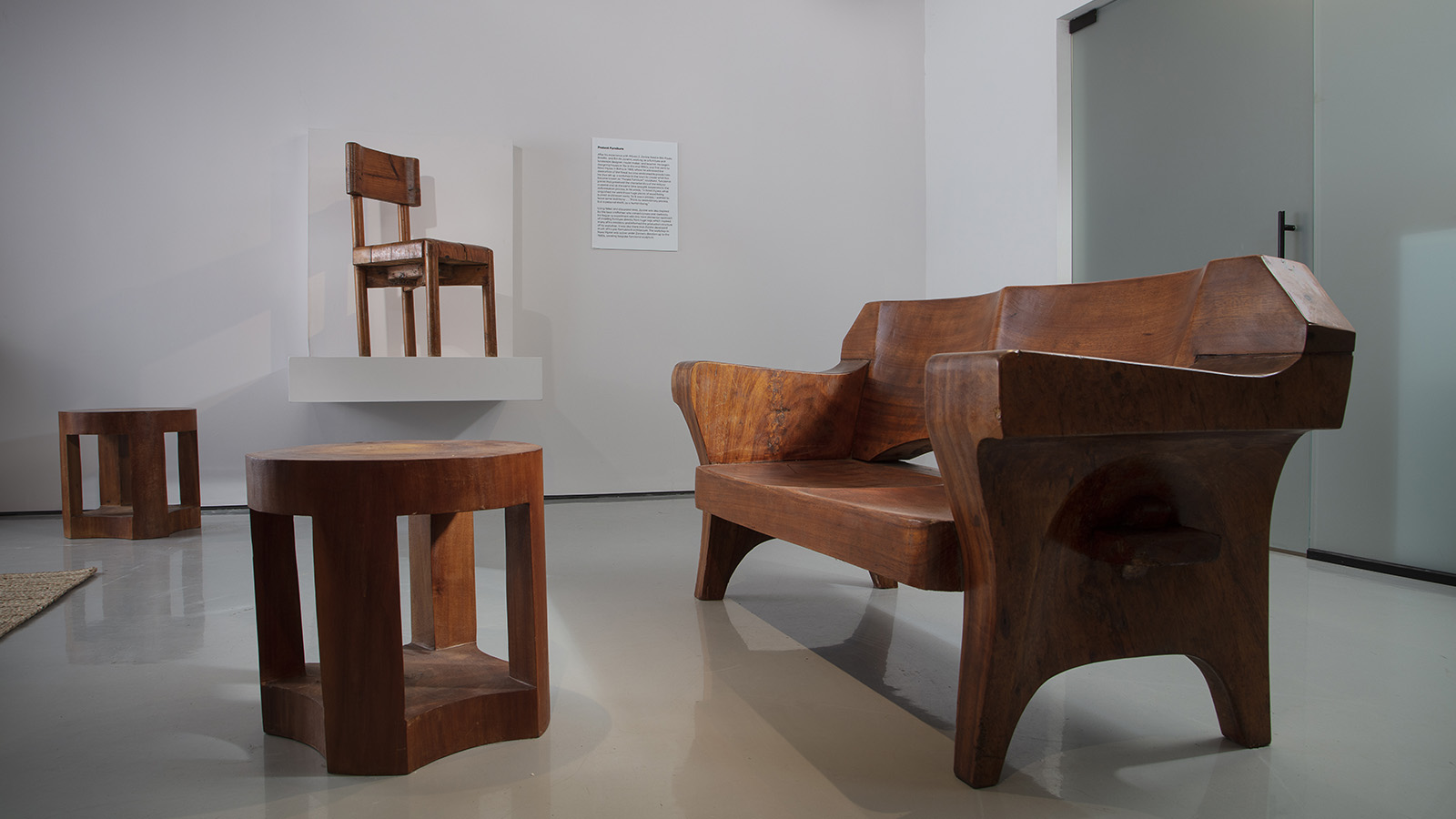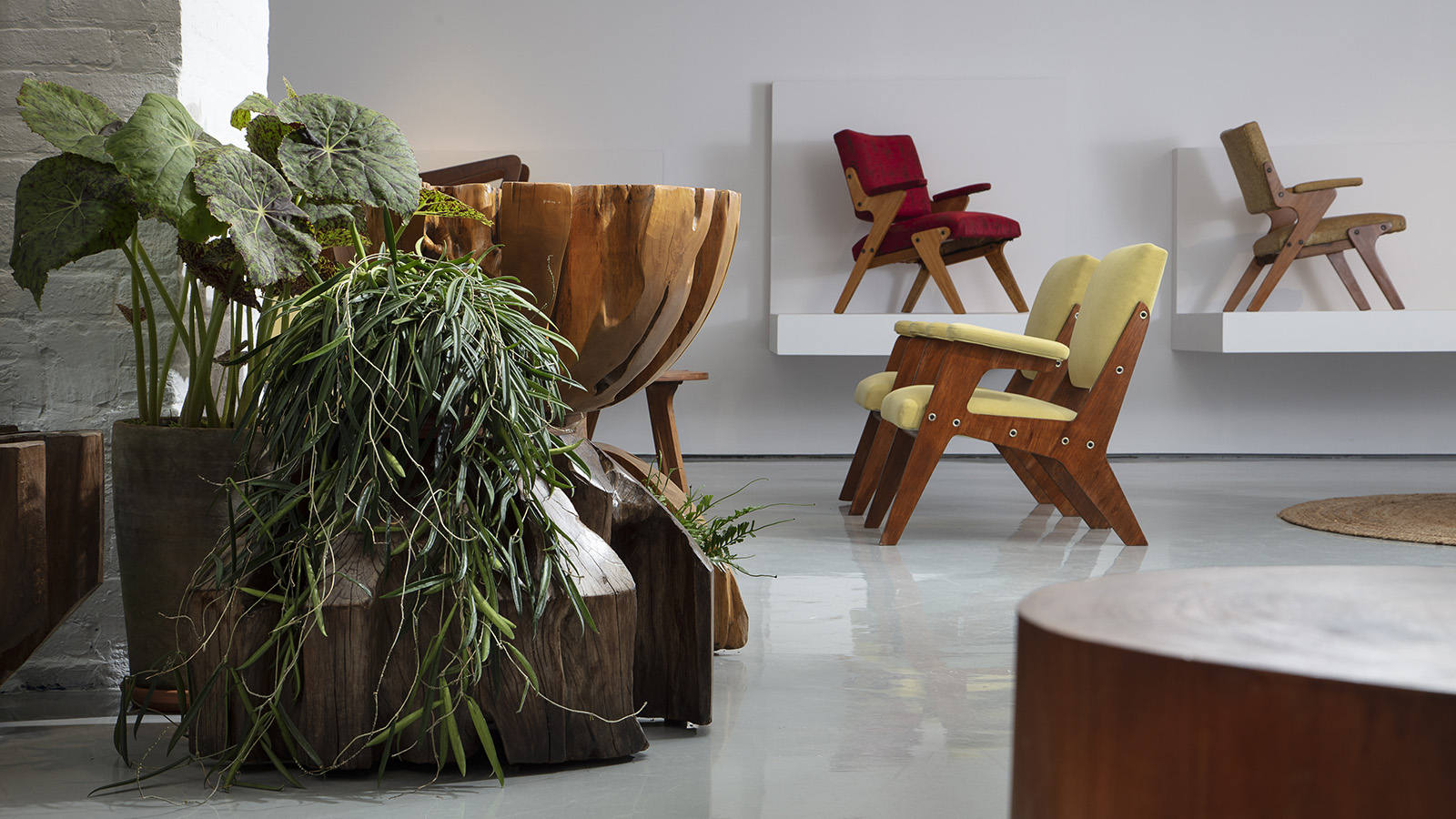Against The Grain: Jose Zanine Caldas (1919 – 2001)
6 November 2019 - 4 January 2020
64 White Street
Featuring
R & Company is thrilled to announce Against The Grain: Jose Zanine Caldas (1919 – 2001), a major retrospective of the pioneering Brazilian modern designer and architect Jose Zanine, opening at the gallery’s 64 White Street location on November 6th. Celebrating Zanine’s prolific career, the exhibition coincides with the one hundred year anniversary of his birthdate in 1919 and is accompanied by the release of the first extensive bilingual Portuguese-English publication José Zanine Caldas published by Editora Olhares and R & Company with a preface by Zesty Meyers and essays by preeminent Brazilian scholars Amanda Beatriz Palma de Carvalho, Lauro Cavalcanti and Maria Cecília Loschiavo dos Santos.
Internationally recognized as one of the most innovative leaders of the Brazilian modern design movement, Zanine left an impressive legacy and global influence. Self-taught, Zanine stood apart from his contemporaries for his freedom in material exploration and his ability to harmoniously balance nature and craft in his forward thinking practice. His multifaceted career ranged from sculpture and furniture to landscape and architectural design for both low income and elite housing throughout Brazil. The exhibition surveys over forty years of his diverse practice by presenting both iconic and never-before seen designs alongside archival drawings, photography and videos that reveal the story behind his unique thought process.
Offering a glimpse into his extraordinary life, the retrospective at R & Company highlights a collection of works made from the 1940s to the 1980s that demonstrate Zanine’s expansive practice. The early designs reveal Zanine’s fascination with craft, structure and dedication to local traditions. His later designs demonstrate an evolution towards a more expressive interest in material and a strong devotion to environmental protection. Zanine often worked with local and recycled Brazilian woods, and as his designs developed over the years his approach became increasingly more raw and energetic. The retrospective celebrates all facets of his life and the great achievements he accomplished through passion, dedication and a devotion to push forward the limits of modern design.
“Zanine’s legacy has taught me that freedom of thought can surpass many obstacles, that what seems basic may actually be very sophisticated, and that one should be brave to work with what is available,” states Zesty Meyers. “The fruits of his labor in design and architecture are stunning as much as they are inspiring, This is what Zanine should be recognized for today, and why his work will matter tomorrow.”
Against The Grain: Jose Zanine Caldas (1919 – 2001) will be on view from November 6 through December 21 on the lower level of R & Company’s 64 White Street location and will coincide with the exhibition LOVE by Pierre Yovanovitch.
About José Zanine Caldas
A self-taught artist, designer, and architect, Jose Zanine Caldas (1918-2001) was born in Belmonte, on the southern coast of Bahia, Brazil. He moved to São Paulo as a young man and later made his way to Rio de Janeiro, where he first worked as a restorer for the National Historic and Artistic Heritage Service and later started an architectural scale model workshop. In this context, Zanine met and worked with some of the architects responsible for bringing Modernism to Brazil, such as Oscar Niemeyer and Lúcio Costa.
Through his model building work, Zanine realized that plywood — then an innovation in the construction market — lent itself perfectly to mass furniture production and started the “Z Artistic Furniture” line (Móveis Artísticos Z) in São José dos Campos in 1948. However, despite the business’s success, Zanine left the company in 1952 because of internal conflicts with his partners.
Zanine then moved back to São Paulo and worked simultaneously as a furniture and landscape designer, model maker, and teacher at the Faculty of Architecture and Urbanism of the University of São Paulo. Still in the 1950s, Zanine also designed iron furniture and opened a ceramics shop, but closed all ventures and moved to Brasília by the end of the decade. There, he coordinated the model workshop at the University of Brasília, started a landscape design practice, and built his first houses.
Zanine moved back to Rio because of the military coup of 1964 and designed several houses in Joatinga over the next years. In 1968, he went to Nova Viçosa in Bahia, where his hardwood furniture design began as a protest against the destruction of the forest that he witnessed there. Zanine was also inspired by the local craftsmen who carved canoes and rowboats from felled trees and began to experiment with this more elemental approach of chiseling furniture directly from the huge logs. Zanine thus honed his signature style as a designer with these organic, sculptural pieces.
He caused a stir of controversy in the Brazilian design community by continuously designing houses in various states of the country without an architecture degree. Lúcio Costa, among others, took up his cause and helped him obtain an honorary degree, which was finally awarded in 1991.
A life-long proponent of forest protection, Zanine attempted to plant a new tree every time a tree was taken down for one of his projects. His essays about Brazil’s relationship to its forests draw upon architectural history since the Roman Empire, philosophy, and folktales in order to present his passionate views on the power of solid wood as a material.
Zanine’s work has been shown at the Musée des Arts Décoratifs du Louvre in Paris, at the Museu de Arte Moderna of Rio de Janeiro and São Paulo, Brazil, and in the exhibition, Moderno: Design for Living in Brazil, Mexico and Venezuela 1940-1978, a traveling exhibition organized by the Americas Society in New York City.

